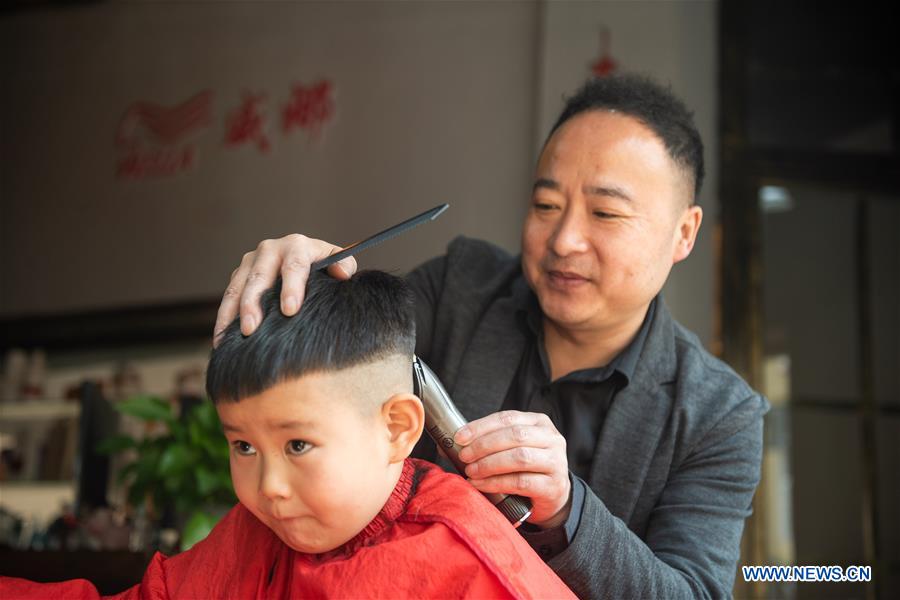


A child has hair cut at a barbershop in the City of Yantai, east China's Shandong Province, on March 8, 2019.
At the beginning of February of the lunar calendar, many regions across China enter into their rainy season. The ancients believed that this was thanks to the dragon. The dragon has a very high status in the minds of the Chinese, not only as an auspicious symbol, but also as the master of rain. This year's "Dragon-Head-Raising Day" falls on March 8, coinciding with "International Women's Day."
Astronomists note that it is rare for "Women's Day" and "Dragon-Head-Raising Day" to coincide, with the two only falling on the same date three times this century.
In terms of the lunar calendar, the beginning of February finds itself amid the three solar terms "rainwater," "awakening of insects" and "spring equinox". During this period, the temperature rises and the land thaws. In many places, especially in the north, rainfall begins. Farmers busy themselves with plowing, making sure not to miss the best time of year. Just before the spring plowing season starts, farmers will worship the dragon and pray for rain, hoping for a good harvest.
Shaving dragon hair
A well-known Chinese folk song says "Shaving dragon hair on February 2, every day a good spirit."
The so-called "shaving dragon hair" refers to a haircut on the second day of February. Having a haircut on this date is said to bring health and prosperity to every child, and adults will also cut their hair in the hope it brings them luck in the coming year. On February 2, barber shops are full of customers.
Worship dragon gods
As the saying goes, "The sky will not rain if the dragon does not look up." According to Chinese ancestors, the dragon is the god of rain. The amount of rainfall is directly linked to how abundant crops will be that year. Therefore, to please the dragon gods, people will hold a grand ceremony to offer sacrifices and sing in the temple of the dragon.
Eating dragon food
From February 2, food is more abundant in China. Delicious food left over from the New Year period will be taken out. Once this has been eaten, people prepare new dishes based on the dragon elements of this day.
The title of "dragon" is also added to a number of foods eaten on this day to make them more auspicious. For example, eating dumplings is called "eating dragon ear", spring cake is known as "dragon scale", noodles are called "dragon whisk", and rice is named "dragon egg."
Spring outing
In the south, February 2 is also known as "Outing Day". According to legend, since the Tang Dynasty, people of Chang'an would take a trip to the suburbs on this day. Traditionally, some women carried baskets to dig up fresh edible wild herbs. It is beneficial to go out when the spring comes, as it can help restore physical and mental health.

 Award-winning photos show poverty reduction achievements in NE China's Jilin province
Award-winning photos show poverty reduction achievements in NE China's Jilin province People dance to greet advent of New Year in Ameiqituo Town, Guizhou
People dance to greet advent of New Year in Ameiqituo Town, Guizhou Fire brigade in Shanghai holds group wedding
Fire brigade in Shanghai holds group wedding Tourists enjoy ice sculptures in Datan Town, north China
Tourists enjoy ice sculptures in Datan Town, north China Sunset scenery of Dayan Pagoda in Xi'an
Sunset scenery of Dayan Pagoda in Xi'an Tourists have fun at scenic spot in Nanlong Town, NW China
Tourists have fun at scenic spot in Nanlong Town, NW China Harbin attracts tourists by making best use of ice in winter
Harbin attracts tourists by making best use of ice in winter In pics: FIS Alpine Ski Women's World Cup Slalom
In pics: FIS Alpine Ski Women's World Cup Slalom Black-necked cranes rest at reservoir in Lhunzhub County, Lhasa
Black-necked cranes rest at reservoir in Lhunzhub County, Lhasa China's FAST telescope will be available to foreign scientists in April
China's FAST telescope will be available to foreign scientists in April